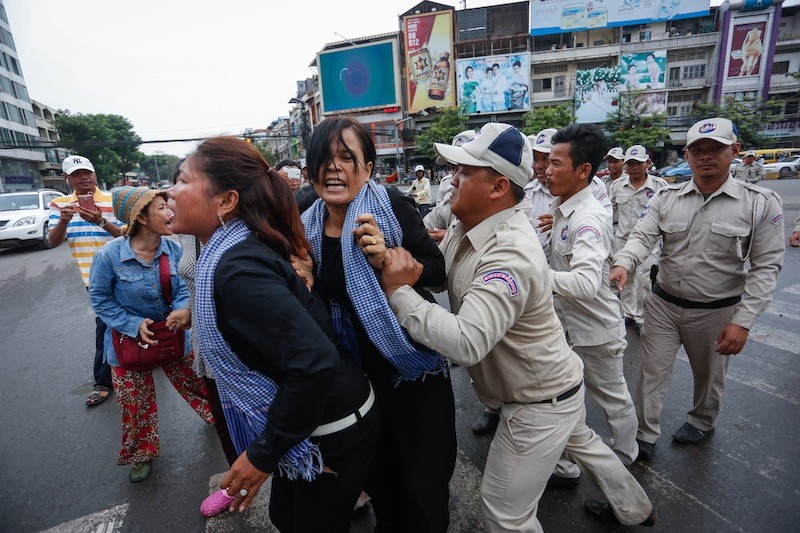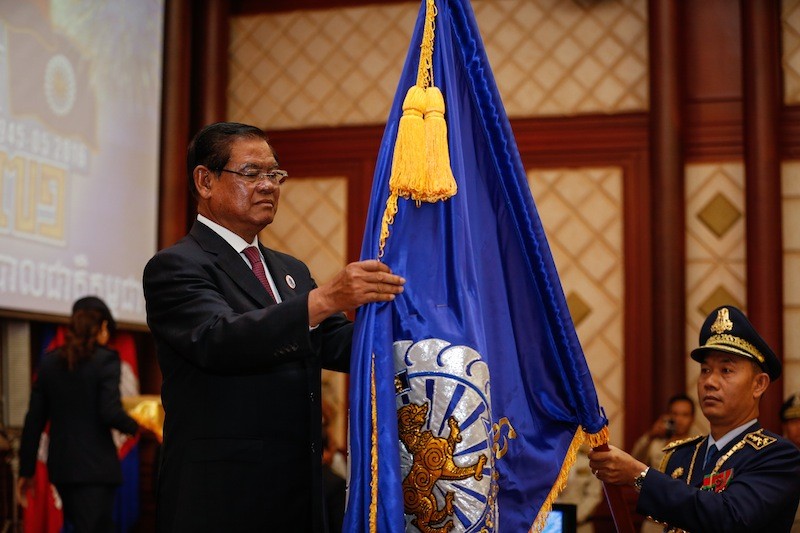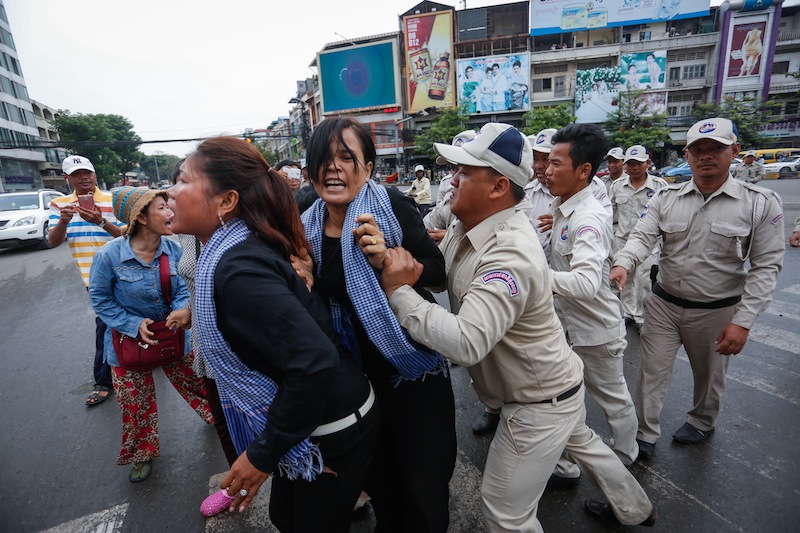Interior Minister Sar Kheng made the rather frank assessment on Monday that a much-discussed “color revolution” could occur in Cambodia only as a response to an inactive government.
Mr. Kheng’s remarks came hours after five more peaceful protesters were arrested in the morning while waiting to join the second “Black Monday” demonstration against recent sweeping arrests of civil society activists.

“I want to clarify that according to my understanding, the color revolution could occur because of inactiveness in our management,” Mr. Kheng said, speaking at a ceremony to mark the 71st anniversary of the national police.
“If our management can allow them to live with happiness together, there is no reason for a color revolution to happen,” he added.
Prime Minister Hun Sen has repeatedly called on leaders of security forces, including Mr. Kheng, to ensure that a “color revolution” does not take hold in Cambodia and threaten the social stability he claims to have fostered over 31 years in power.
Mr. Kheng on Monday stressed the need to be proactive in identifying the causes of dissent.
“Sometimes, people only speak from one to another, so we do not know what the color revolution is. We do not know what the reason is for a color revolution,” Mr. Kheng said, citing forestry issues as an example.
“If the people criticize the bad management of forests, so we must work hard to protect forests well and find solutions through justice by the law, and we do not need to crack down on people,” he said.
The latest fears of a color revolution have come as civil society groups have organized a campaign calling for people to wear black shirts on Mondays to call for the release of four arrested officers from rights group Adhoc and a former officer of the NGO who is now a senior election official.
Shortly after 8 a.m. on Monday, five land rights activists were detained in Phnom Penh during the second Black Monday protest, as authorities made good on threats that led many prominent campaign leaders to cancel this week’s protest.
The women, all land rights activists from eviction-hit communities in the capital, attempted to gather near Chenla Theater in the morning but were met by police in riot gear who informed them that their protest would not be allowed to proceed.
After a brief argument with police, the women began walking down Monireth Boulevard, where Tuol Kok district security guards arrived in two trucks and pushed the women kicking and screaming onto one of the vehicles before taking them to the district police station.

Deputy Phnom Penh governor Khuong Sreng said the women—Chray Nim, Yin Srin, Ngov Nary, Im Sreytouch and Phok Sophin—were simply “invited” for questioning by police.
“We did not detain them. We have just invited them for questioning at Tuol Kok district police station. There were three, four to five people wearing black shirts and holding banners,” Mr. Sreng said, declining to comment further.
City Hall spokesman Mean Chanyada contradicted his colleague later in the day, confirming that the five protesters were arrested as they had violated a ban on wearing black shirts during demonstrations.
“Their rally violated the ban of the Phnom Penh City Hall which does not let anyone rally like this. They are against the authorities so we need to bring them for questioning about their activities,” Mr. Chanyada said.
Ms. Sophin was the first person to be released at around 4 p.m. after she agreed to thumbprint a contract stating she would stay away from future protests. Ms. Nary and Ms. Srin were also released at around 7:30 p.m. after eventually agreeing to thumbprint the document.
Ms. Sreytouch and Ms. Nim refused to sign the document until police finally agreed to remove a clause precluding them from wearing black T-shirts and were released after giving their thumbprints at around 10 p.m., Ms. Nary said.
“Police asked me which NGOs are behind us or who is our mastermind. I responded that no one is behind us; we did it by ourselves,” she said.
Chhay Kimhorn, 39, a land rights activist from Phnom Penh’s Borei Keila neighborhood, said dozens of riot police and armed security guards descended on the community in the morning to ensure none of them joined any protests.
“Those police and security guards blocked us from leaving the community to join the protest. They also asked us to change our black clothing,” Ms. Kimhorn said.
Last Monday, eight black-clad human rights officers and activists were jailed and released near Prey Sar prison in the first Black Monday protest, which came as the government ramped up its investigation into a sex scandal involving deputy opposition leader Kem Sokha.
The Adhoc officials, together with National Election Committee deputy secretary-general Ny Chakrya, were jailed on May 2 for allegedly conspiring to bribe the supposed 25-year-old mistress to deny the affair. A U.N. official was also charged in absentia over the case but remains free.




